- Home
- Chuck Palahniuk
Choke Page 9
Choke Read online
Page 9
And I say, “She. It’s Dr. Paige Marshall. She’s a woman.”
Another patient presents herself, a curly-haired brunette, about twenty-five years old, exhibiting a possible folic acid deficiency, her tongue red and glazed-looking, her abdomen slightly distended, her eyes glassy. I ask, can I listen to her heart. For palpitations. For rapid heartbeat. Has she had any nausea or diarrhea?
“Dude?” Denny says.
The questions to ask about pain are COLDERRA: Characteristics, Onset, Location, Duration, Exacerbation, Relief, Radiation, and Associated Symptoms.
Denny says, “Dude?”
The bacteria called Staphylococcus aureus will give you STAPHEO: Skin Infections, Toxic Shock Syndrome, Abscesses, Pneumonia, Hemolysis, Endocarditis, and Osteomyelitis.
“Dude?” Denny says.
The diseases a mother can pass to her baby are TORCH: Toxoplasmosis, Other (meaning syphilis and HIV), Rubella, Cytomegalovirus, and Herpes. It helps if you can picture a mother passing the torch to her baby.
Like mother, like son.
Denny snaps his fingers in my face. “What’s up with you? How come you’re being like this?”
Because it’s the truth. This is the world we live in. I’ve been there, taken the MCAT The Medical College Admission Test. I went to the USC School of Medicine long enough to know that a mole is never just a mole. That a simple headache means brain tumors, means double vision, numbness, vomiting followed by seizures, drowsiness, death.
A little muscle twitch means rabies, means muscle cramps, thirst, confusion, and drooling, followed by seizures, coma, death. Acne means ovarian cysts. Feeling a little tired means tuberculosis. Bloodshot eyes mean meningitis. Drowsiness is the first sign of typhoid. Those floaters you see cross your eyes on sunny days, they mean your retina is detaching. You’re going blind.
“See how her fingernails look,” I tell Denny, “that’s a sure sign of lung cancer.”
If you’re confused, that means renal shutdown, severe kidney failure.
You learn all this during Physical Examination, your second year in medical school. You learn all this, and there’s no going back.
Ignorance was bliss.
A bruise means cirrhosis of the liver. A belch means colorectal cancer or esophageal cancer or at the very least a peptic ulcer.
Every little breeze seems to whisper squamous carcinoma.
Birds in the trees seem to twitter histoplasmosis.
Everybody you see naked, you see as a patient. A dancer could have clear lovely eyes and hard brown nipples, but if her breath is bad she has leukemia. A dancer might have thick, long, clean-looking hair, but if she scratches her scalp, she has Hodgkin’s lymphoma.
Page by page, Denny fills up his pad with figure studies, beautiful women smiling, thin women blowing him kisses, women with their faces tilted down, but their eyes looking up at him through falls of hair.
“Losing your sense of taste,” I tell Denny, “means oral cancers.”
And without looking at me, looking back and forth between his sketch and the new dancer, Denny says, “Then, dude, you got that cancer a long time ago.”
Even if my mom died, I’m not sure if I’d want to go back and get readmitted before my credits start to expire. As it is, I already know way more than I’m comfortable with.
After you find out all the things that can go wrong, your life becomes less about living and more about waiting. For cancer. For dementia. Every look in a mirror, you scan for the red rash that means shingles. See also: Ringworm.
See also: Scabies
See also: Lyme disease, meningitis, rheumatic fever, syphilis.
The next patient who presents herself is another blonde, thin, maybe a little too thin. A spinal tumor probably. If she has a headache, a low fever, a sore throat, she has polio.
“Go like this,” Denny yells up to her, and he covers his eyeglasses with his open hands.
The patient does this.
“Beautiful,” Denny says, sketching a study fast. “How about if you open your mouth a little.”
And she does.
“Dude,” he says. “Workshop models are never this hot.”
All I can see is she’s not a very good dancer and, for sure, this lack of coordination means amyotrophic lateral sclerosis.
See also: Lou Gehrig’s disease.
See also: Total paralysis. See also: Difficulty breathing. See also: Cramps, tiredness, crying.
See also: Death.
With the edge of his hand, Denny smears the cork lines to add shadow and depth. It’s the woman onstage with her hands over her eyes, her mouth slightly open, and Denny picks at it fast, his eyes going back to the woman for details, her belly button, the curve of her hipbones. My only gripe is the way Denny draws women is not the way they look for real. In Denny’s version, the cheesy thighs on some woman will look rock-solid. The bagged-out eyes on some other woman will become clear and toned underneath.
“You got any cash left over, dude?” Denny says. “I don’t want her to move on just yet.”
But I’m broke, and the girl moves on to the next guy down along the stage.
“Let’s see, Picasso,” I tell him.
And Denny scratches under his eye and leaves a big smudge of soot. Then he tips the legal pad enough for me to see a naked woman with her hands over her eyes, sleek and tensing every muscle tight, none of her looks trashed by gravity or ultraviolet light or poor nutrition. She’s smooth but soft. Flexed but relaxed. She’s a total physical impossibility.
“Dude,” I say, “you made her look too young.”
The next patient is Cherry Daiquiri again, coming back around, not smiling this time, sucking hard on the inside of one cheek and asking me, “This mole I have? You sure it’s cancer? I mean, I don’t know, but how scared should I be … ?”
Without looking at her, I hold up one finger. This is international sign language for Please wait. The doctor will see you shortly.
“No way are her ankles that thin,” I tell Denny. “And her ass is way bigger than you have there.”
I lean over to see what Denny’s doing, then look down the stage to the last patient. “You need to make her knees lumpier,” I say.
The downstage dancer gives me a filthy look.
Denny just keeps sketching. He makes her eyes huge. He fixes her split ends. He gets everything all wrong.
“Dude,” I say. “You know, you’re not a very good artist.”
I say, “For serious, dude, I don’t see that at all.”
Denny says, “Before you go trash the whole world, you need to be calling your sponsor, bad.” He says, “And in case you still give a shit, your mom said you need to read what’s in her dictionary.”
To Cherry crouching there in front of us, I say, “If you’re really serious about saving your life, I’m going to have to talk to you someplace private.”
“No, not dictionary,” Denny says, “it’s diary. In case you ever wonder where you really come from, it’s all in her diary.”
And Cherry dangles one leg over the edge and starts climbing down off the stage.
I ask him, what’s in my mom’s diary?
And drawing his little pictures, seeing the impossible, Denny says, “Yeah, diary. Not dictionary, dude. The stuff about your real dad is in her diary.”
Chapter 17
At St. Anthony’s, the front desk girl yawns behind her hand, and when I ask if maybe she wants to go get a cup of coffee, then she looks at me sideways and says, “Not with you.”
And really, I’m not hitting on her. I’ll watch her desk long enough for her to go get some coffee. This isn’t a come-on.
Really.
I say, “Your eyes look tired.”
All she does all day is sign a few people in and out. She watches the video monitor that shows the insides of St. Anthony’s, each corridor, the dayroom, the dining room, the garden, the screen switching from one to the next every ten seconds. The screen grainy, black-and-white. On the m
onitor, the dining room shows for ten seconds, empty with all the chairs upside down on each table, their chrome legs in the air. A long corridor appears for the next ten seconds with somebody heaped on a bench against one wall.
Then for the next ten furry black-and-white seconds, there’s Paige Marshall pushing my mom in a wheelchair down some other long corridor.
The front desk girl says, “I’ll only be gone a minute.”
Next to the video monitor is an old speaker. Covered in nubby sofa mohair is this old radio kind of speaker with a dial switch surrounded by numbers. Each number is some room in St. Anthony’s. On the desk is a microphone you can use to make announcements. By turning the dial switch to a number, you can listen in on any room in the building.
And for just a moment, my mom’s voice comes from the speaker, saying, “I’ve defined myself, all my life, by what I was against … ”
The girl switches the intercom dial to nine, and now you can hear Spanish radio and the clatter of metal pans back in the kitchen, back where the coffee is.
I tell the girl, “Take your time.” And, “I’m not the monster you maybe heard from some of the bitter, angry types around here.”
Even with me being so nice, she puts her purse in her desk and locks it. She says, “This won’t take me more than a couple minutes. Okay?”
Okay.
Then she’s gone through the security doors, and I’m sitting behind her desk. Watching the monitor: the dayroom, the garden, some corridor, each for ten seconds. Watching for Paige Marshall. With one hand, I’m dial-switching from number to number, listening in each room for Dr. Marshall. For my mom. In black-and-white, almost live.
Paige Marshall with all her skin.
Another question from the sex addict checklist:
Do you cut the inside out of your pants pockets so you can masturbate in public?
In the dayroom is some grayhead, facedown in a puzzle.
In the speaker there’s just static. White noise.
Ten seconds later, in the crafts room is a table of old women. Women I confessed to, for wrecking their cars, for wrecking their lives. Taking the blame.
I turn up the volume and put my ear against the cloth of the speaker. Not knowing which number means which room, I dial-switch through the numbers and listen.
My other hand I slip into what used to be my britches pocket.
Going number to number, somebody’s sobbing on number three. Wherever that is. Somebody’s swearing on five. Praying on eight. Wherever that is. The kitchen again on nine, the Spanish music.
The monitor shows the library, another corridor, then it shows me, a grainy black-and-white me, crouched behind the front desk, peering into the monitor. Me with one hand crabbed around the intercom control dial. My other blurry hand is jammed to the elbow inside my britches. Watching. A camera on the lobby ceiling watching me.
Me watching for Paige Marshall.
Listening. For where to find her.
“Stalking” isn’t the right word, but it’s the first word that comes to mind.
The monitor shows me one old woman after another. Then for ten seconds, there’s Paige pushing my mom in a wheelchair down another corridor. Dr. Paige Marshall. And I dial around until I hear my mom’s voice.
“Yes,” she says, “I fought against everything, but more and more I worry that I was never for anything.”
The monitor shows the garden, old women hunched over walkers. Mired in gravel.
“Oh, I can criticize and complain and judge everything, but what does that get me?” my mom keeps saying in voice-over as the monitor cycles to show other rooms.
The monitor shows the dining room, empty.
The monitor shows the garden. More old people.
This could be some very depressing website. Death Cam.
Some kind of black-and-white documentary.
“Griping isn’t the same as creating something,” my mom’s voice-over says. “Rebelling isn’t rebuilding. Ridiculing isn’t replacing … ” And the voice in the speaker fades out.
The monitor shows the dayroom, the woman facedown in her puzzle.
And I dial-switch from number to number, searching.
On number five, her voice is back. “We’ve taken the world apart,” she says, “but we have no idea what to do with the pieces … ” And her voice is gone, again.
The monitor shows one empty corridor after another stretching into darkness.
On number seven, the voice comes back: “My generation, all of our making fun of things isn’t making the world any better,” she says. “We’ve spent so much time judging what other people created that we’ve created very, very little of our own.”
Out of the speaker, her voice says, “I used rebellion as a way to hide out. We use criticism as a fake participation.”
The voice-over says, “It only looks as if we’ve accomplished something.”
The voice-over says, “I’ve never contributed anything worthwhile to the world.”
And for ten seconds, the monitor shows my mom and Paige in the corridor just outside the crafts room.
Out of the speaker, scratchy and far away, Paige’s voice says, “What about your son?”
My nose pressed to the monitor, I’m so close.
And now the monitor shows me with my ear pressed to the speaker, one hand shaking something, fast, inside my pant leg.
In voice-over, Paige says, “What about Victor?”
And for serious, I am so ready to trigger.
And my mom’s voice says, “Victor? No doubt Victor has his own way of escaping.”
Then her voice-over laughs and says, “Parenthood is the opiate of the masses!”
And now on the monitor, the front desk girl is standing right behind me with a cup of coffee.
Chapter 18
My next visit, my mom’s thinner, if that’s possible. Her neck looks as small around as my wrist, the yellow skin sunk into deep hollows between her cords and throat. Her face doesn’t hide the skull inside. She rolls her head to one side so she can see me in the doorway, and some kind of gray jelly is caked in the corners of each eye.
The blankets are slack and tented empty between the two peaks of her hipbones. The only other landmarks you can recognize are her knees.
She twines one terrible arm through the chrome bed rail, terrible and thin as a chicken foot reaching toward me, and she swallows. Her jaws work with effort, her lips webbed with spit, and then she says it, reaching out, she says it.
“Morty,” she says, “I am not a pimp.” Her hands knotted in fists, she shakes them in the air and says, “I’m making a feminist statement. How can it be prostitution if all the women were dead?”
I’m here with a nice bunch of flowers and a get-well card. This is right after work, so I’m in my britches and waistcoat. My buckle shoes and the clocked stockings that show off my skinny calves are spattered with mud.
And my mom says, “Morty, you have to get the whole case thrown out of court.” And she sighs back into her stack of pillows. Drool from her mouth has turned the white pillowcase light blue where it meets the side of her face.
A get-well card is not going to fix this.
Her hand claws the air, and she says, “Oh, and Morty, you need to call Victor.”
Her room has that smell, the same smell as Denny’s tennis shoes in September after he’s worn them all summer without socks.
A nice bunch of flowers won’t even make a dent.
In my waistcoat pocket is her diary. Stuck in the diary is a past-due bill from the care center. I stick the flowers in her bedpan while I go hunt for a vase and maybe something to feed her. As much of that chocolate pudding stuff as I can carry. Something I can spoon into her mouth and make her swallow.
The way she looks I can’t bear to be here and I can’t bear to not be here. As I leave she says, “You’ve got to get busy and find Victor. You have to make him help Dr. Marshall. Please. He has to help Dr. Marshall save me.”
As
if anything ever happens by accident.
Outside in the hallway is Paige Marshall, wearing her glasses, reading something off a clipboard. “I just thought you’d like to know,” she says. She leans back against the handrail that lines the hallway and says, “Your mother is down to eighty-five pounds this week.”
She moves the clipboard behind her back, gripping it and the handrail with both hands. The way she stands puts her breasts forward. Tilts her pelvis at me. Paige Marshall runs her tongue along the inside of her bottom lip and says, “Have you thought any more about taking some action?”
Life support, tube feeding, artificial respirators—in medicine they call this stuff “heroic measures.”
I don’t know, I say.
We stand there, waiting for each other to give an inch.
Two smiling old ladies wander past us, and one points and says to the other, “There’s that nice young man I told you about. He’s the one who strangled my pet cat.”
The other lady, her sweater is buttoned wrong, and she says, “You don’t say.” She says, “He beat my sister almost to death one time.”
They wander away.
“It’s sweet,” Dr. Marshall says, “what you’re doing, I mean. You’re giving these people completion on the biggest issues in their lives.”
The way she looks right now, you have to think about multiple car pile-ups. Imagine two bloodmobiles colliding head on. The way she looks, you’d have to think of mass graves to even log thirty seconds in the saddle.
Think of spoiled cat food and ulcerated cankers and expired donor organs.
That’s how beautiful she looks.
If she’ll excuse me, I still need to find some pudding.
She says, “Is it that you have a girlfriend? Is that your reason?”
The reason why we didn’t have sex in the chapel a few days ago. The reason why even with her naked and ready, I couldn’t. The reason why I ran.
For a complete listing of other girlfriends, please refer to my fourth step.
See also: Nico.
See also: Leeza.

 Fight Club
Fight Club Damned
Damned Tell-All
Tell-All Choke
Choke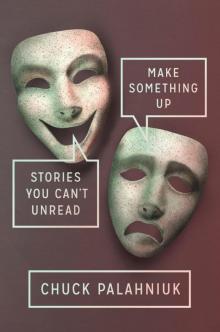 Make Something Up: Stories You Can't Unread
Make Something Up: Stories You Can't Unread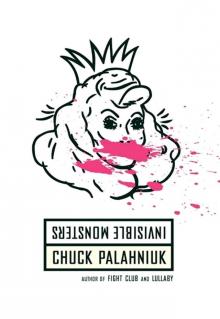 Invisible Monsters
Invisible Monsters Phoenix
Phoenix Beautiful You: A Novel
Beautiful You: A Novel Haunted
Haunted Survivor
Survivor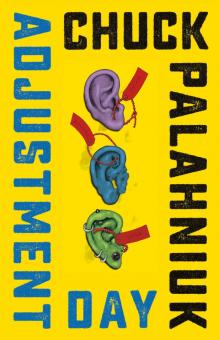 Adjustment Day
Adjustment Day Pygmy
Pygmy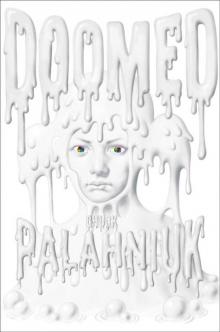 Doomed
Doomed Lullaby
Lullaby Snuff
Snuff Burnt Tongues
Burnt Tongues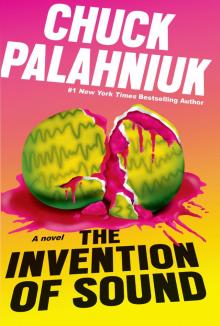 The Invention of Sound
The Invention of Sound Stranger Than Fiction (True Stories)
Stranger Than Fiction (True Stories) Rant: The Oral History of Buster Casey
Rant: The Oral History of Buster Casey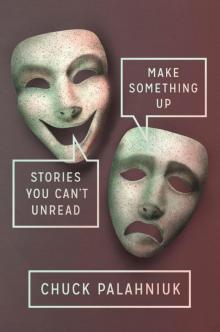 Make Something Up
Make Something Up Rant: An Oral Biography of Buster Casey
Rant: An Oral Biography of Buster Casey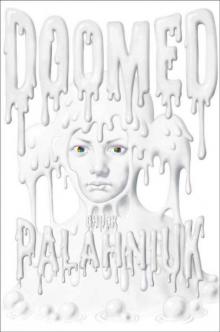 Doomed d-2
Doomed d-2 HOPE AND GORY
HOPE AND GORY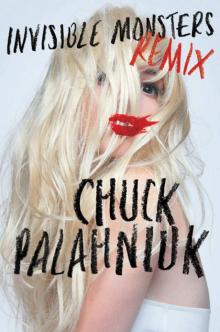 Invisible Monsters Remix
Invisible Monsters Remix Beautiful You
Beautiful You Fugatives & Refugees
Fugatives & Refugees